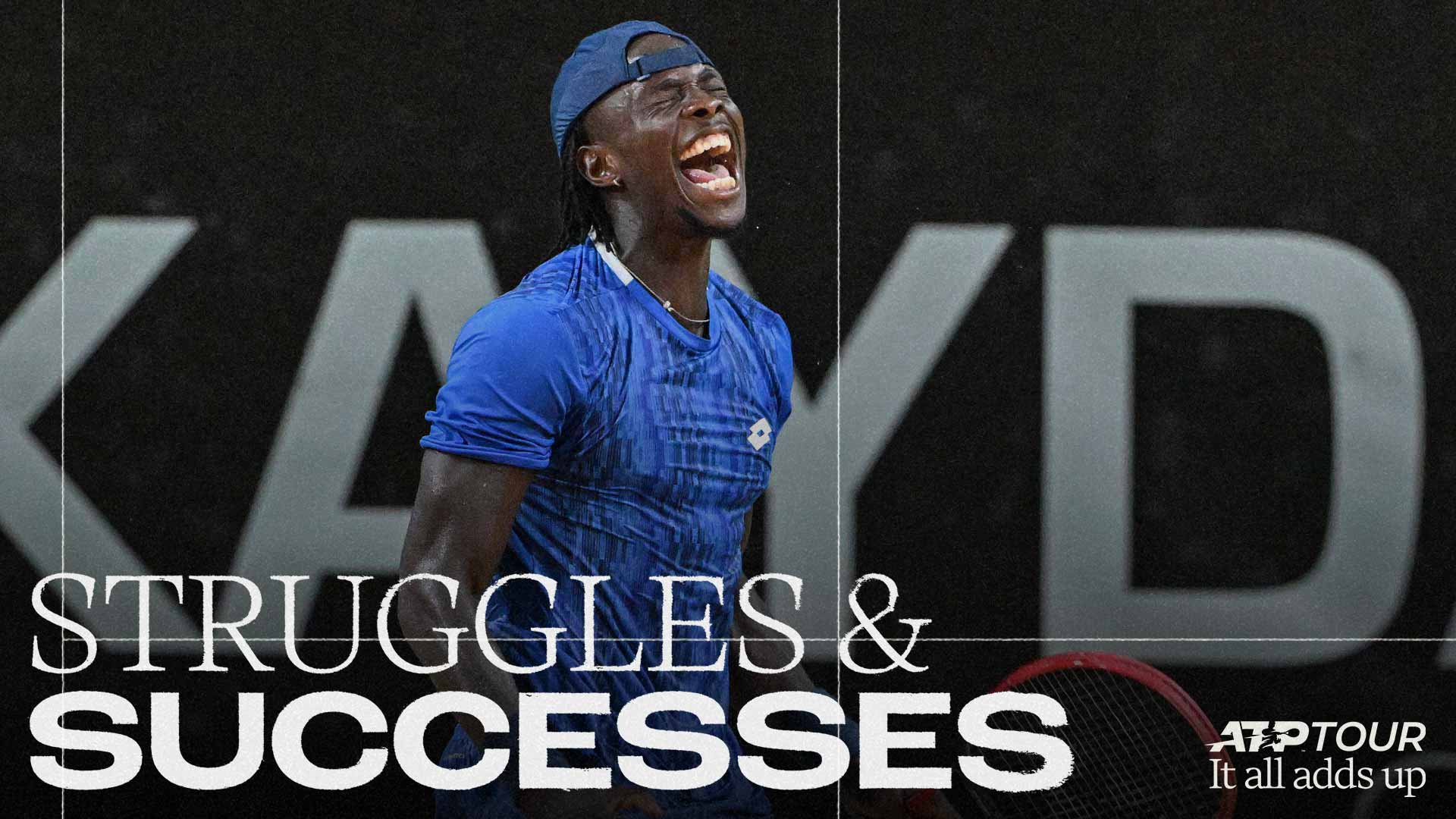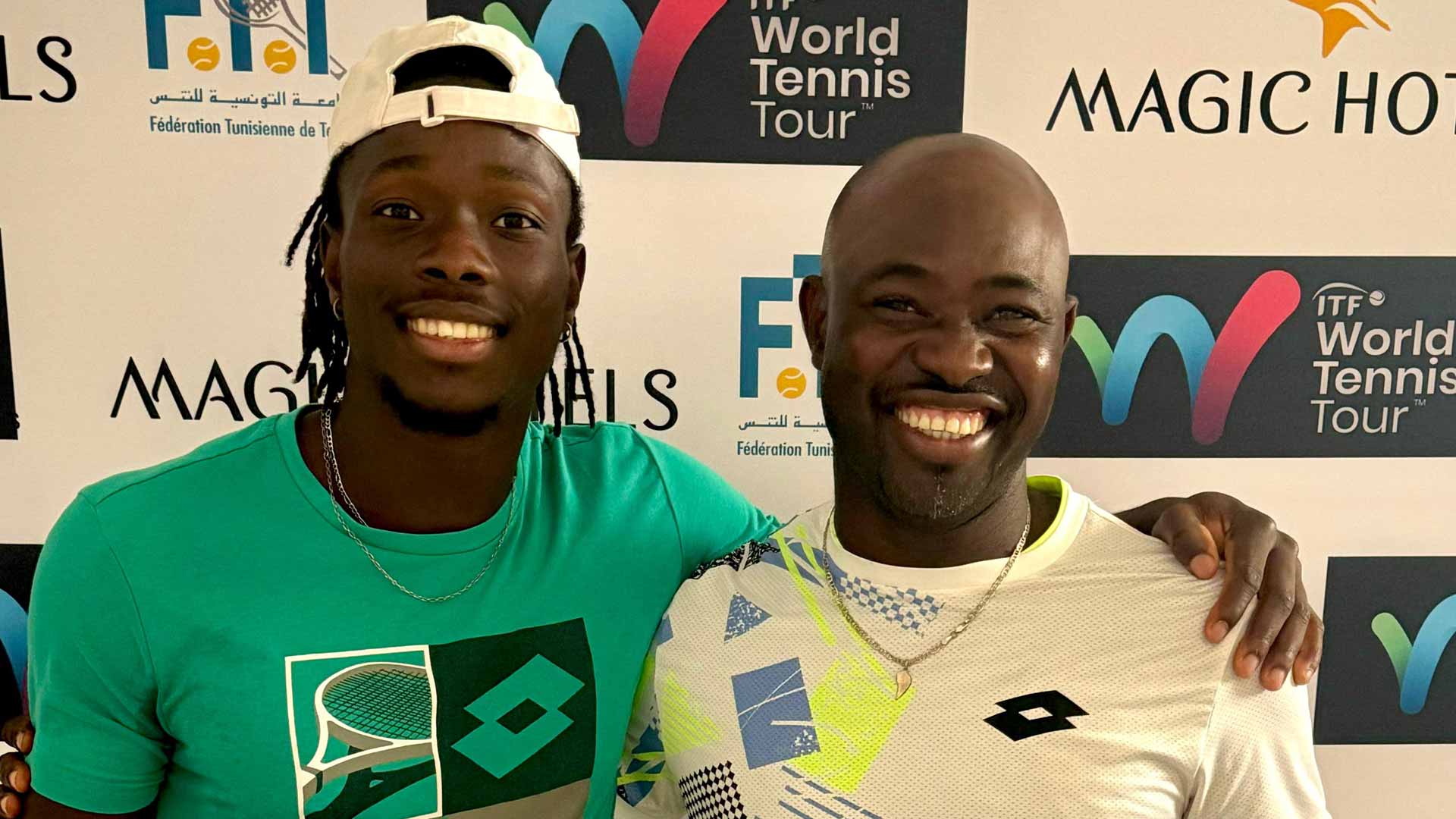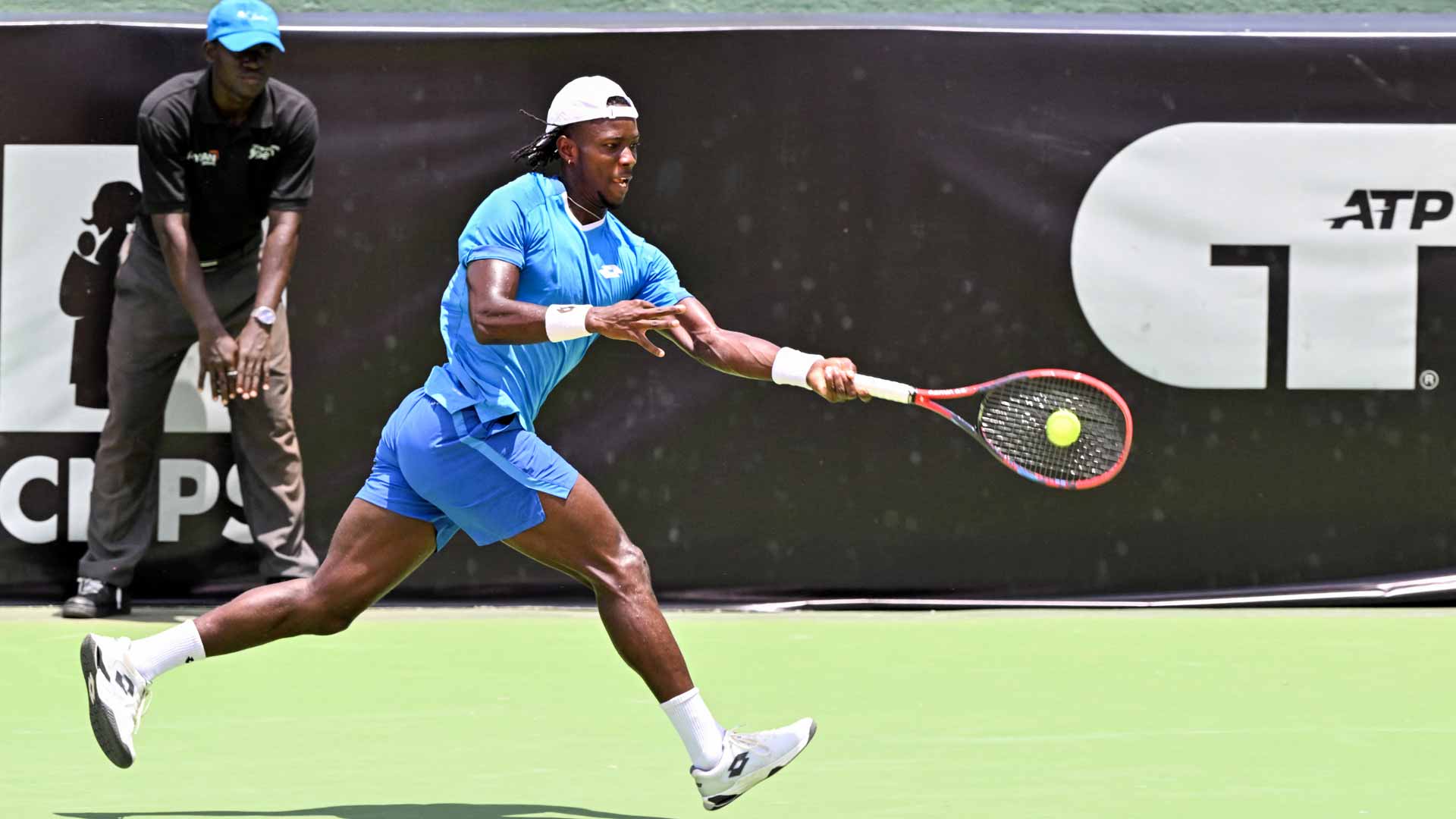

The sound of a tennis ball slamming against the wall echoed through the streets, again and again, hour after hour. Perhaps mundane to some, it was everything to Dieudonne Coulibaly, the father of World No. 272 Eliakim Coulibaly.
Dieudonne started playing tennis as a teenager in Côte d'Ivoire and with no formal training, he simply taught himself the game. The wall was his partner, and perhaps the best one at that. It’s free and the ball always comes back.
Tennis eventually became a way to make ends meet. Despite limited opportunities and few resources in the former capital city Abidjan, Dieudonne saw a chance to earn a living, offering private lessons and teaching others the game he had taught himself.
“At a young age, 16 or 17, he was already renting a house, he was capable of doing things through tennis,” Coulibaly told ATPTour.com, speaking about his father. “He came to the sport to make a living. Because you know in Africa, people aren’t that rich. When you give lessons, you can make some pretty good money that will get you to live. He was living like that.”
The sport that once helped Dieudonne survive evolved into something deeper when his son Eliakim was born.
“That’s when he was like, ‘Okay, I’m going to make this guy something, he’s going to play the sport’. So that’s how I got into tennis,” said the 23-year-old.

Eliakim and Dieudonne Coulibaly. Credit: Coulibaly Family
Together, they began to dream. Could a boy from West Africa defy the odds and become a professional tennis player?
“Not many people know about tennis in Africa. It’s all football, putting money on football. Tennis is not that famous,” Coulibaly said. “The infrastructure is not there. When I was practising with my dad, I was not practising on good courts. But that also gave me a value like, ‘You have to want it this bad’.”
The Ivorian remembers those early years, which featured gruelling practices with his father, not in high-end academies or on pristine courts, but in raw, unforgiving conditions that shaped his strong work ethic.
Whenever Coulibaly sent his racquets to be restrung, it took days to get them back. That only meant one thing: footwork drills and long runs on the beach — his father’s favourite training.
“He was going hard on me because he wanted me to succeed. He wanted me to be a man,” Coulibaly said.
Coulibaly grew up playing football and he also swam, but his dreams belonged to tennis. At age 13, he moved to Casablanca, Morocco to begin training at an ITF high performance centre. It was a bold decision for a young teenager chasing a future far from home. Coulibaly spent five years in Casablanca and during this stint, he reached No. 16 in the junior circuit.
Having trained at the Mouratoglou Tennis Academy in France since 2020, the lefty has received multiple grants through the ITF’s Grand Slam player development programme, which aims to provide players from developing tennis nations and regions with greater access to competitive pathways at an international level. In January, it was announced that Coulibaly would receive a $12,500 grant this season.
The ATP Challenger Tour is also playing a key role in developing tennis in Africa and specifically, Coulibaly’s home country Côte d'Ivoire. Abidjan, the country’s largest city, hosted back-to-back tournaments in April, allowing Côte d'Ivoire to become the 95th country to host an ATP Challenger Tour event.

Eliakim Coulibaly in action at the Abidjan Challenger. Credit: Issouf Sanogo/AFP via Getty Images
Coulibaly competed both weeks and produced contrasting results. The first week, he felt pressure. Playing in front of a home crowd for the first time was overwhelming. “I was not playing free, I was really scared,” Coulibaly said.
But after conversations with his father and a Davis Cup coach, Coulibaly regrouped for the second week.
“My dad was really encouraging. He sent me a message like, ‘Man, I’m really proud of you. You tried your best and just focus on the next week'," Coulibaly said. “That kind of switch in my head, I was like, ‘Oh yeah, that’s what I needed’.
“One of the Davis Cup coaches told me, ‘At the end of the day, you’re doing this for yourself. Either you win or lose, people are still going to talk, so why don’t you go out there and show what you are capable of’.”
Coulibaly turned the pressure into fuel. In the second week, his passion and energy radiated courtside. Coulibaly struck the ball with newfound confidence and went all the way to the title, becoming the first player from Côte d'Ivoire to triumph at ATP Challenger level. It was an emotional scene in a packed stadium while Coulibaly clinched the title and fell on his back in relief. Meanwhile, his home fans visibly jumped for joy.
There was no pressure, just Ivorian pride.
History made at home 🇨🇮
— ATP Challenger Tour (@ATPChallenger) April 27, 2025
Eliakim Coulibaly becomes the first player from Cote d’Ivoire to win a Challenger title!
#ATPChallenger pic.twitter.com/tJbNGX6rnk
After winning the title, Coulibaly’s first phone call with his father was a memorable moment. Dieudonne, who now coaches in Tunisia, told Eliakim that he has always believed in him and that this is not the end. Eliakim agrees; he has ambitions of competing in Grand Slam qualifying tournaments this year, reaching the main draw at the majors, cracking the Top 100 of the PIF ATP Rankings, among other goals as he aims to transition from the ATP Challenger Tour to the ATP Tour.
When asked about one key lesson that he has learned throughout this journey, Coulibaly lit up with a smile.
“Never stop believing, man. Never stop believing,” he said. “I come from fire. I come from Africa. Being an African person and being able to try to make it on the ATP Tour is difficult. You don’t see many too many African players out there trying to play because it’s difficult. But for me it’s just discipline and never stop believing. It’s a tough journey for me.”
That kind of belief is thanks to his father, who gave Eliakim that first spark of inspiration.
“He always provided. He always found a way. Even with being poor, I never lacked anything. Anything that I wanted, he made sure that I had,” Coulibaly said. “That’s something that I value. Even my mom, everything that I needed, they were providing. I never stayed a day being hungry, not eating. I give everything to them and that’s why I’m just trying my best, so I can make it out in this sport and help them so they can be proud of me.”
There is a lot to be proud of for the Coulibaly family, and not just on court. During the Abidjan Challenger, Eliakim graciously invited a ballboy to shadow him throughout the tournament. The 14-year-old was feeding balls to Coulibaly in practice, helping him stretch and enjoying his new role that undoubtedly helped inspire the teenager to chase his own dreams, just like how Eliakim is now living out his. But it has not been easy.
“There’s a struggle behind this story. So that’s why this story is beautiful,” Coulibaly said. “I’ve had so many doubts, but that doesn’t stop me. I’m human, I’m allowed to have doubts, but that won’t stop me because it depends on how you bounce back and I’ve been bouncing back really well and there’s no room for negativity.”
Coulibaly’s home triumph in Abidjan was a career milestone, but the African talent is aiming even higher.
“Yeah I won my first title, but now that’s when everything starts. We’ve got to keep working hard, digging deep,” Coulibaly said. “It’s just the beginning.”